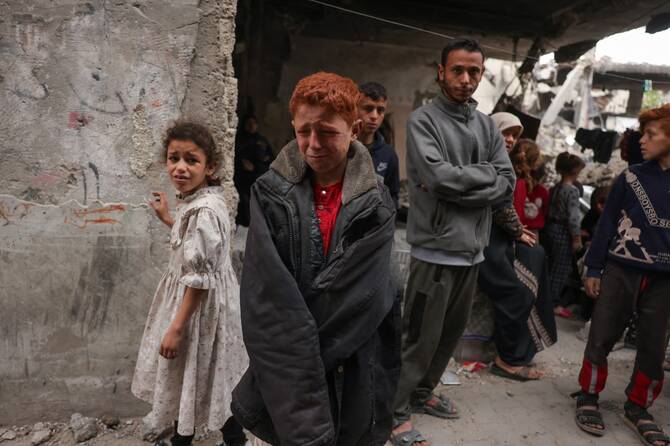DEIR AL-BALAH: A senior Hamas official told AFP on Tuesday that the Palestinian Islamist movement will “most likely” respond to an Israeli ceasefire proposal it received through mediators within 48 hours.
“Hamas will most likely send its response to the mediators within the next 48 hours, as the movement is still conducting in-depth consultations... within its leadership framework, as well as with resistance factions, in order to formulate a unified position,” the official told AFP.
A Hamas official said Monday that the group is sending a delegation to Qatar to continue indirect ceasefire talks with Israel over the war in Gaza, as the territory’s Health Ministry said that 38 people were confirmed dead over the past day.
The Hamas official said teams have been discussing terms for a new ceasefire agreement over recent days in Cairo, including a proposal that Hamas free eight to 10 hostages held in Gaza. But the Hamas official said a major sticking point remained over whether the war would end as part of any new deal.
The talks in Qatar are meant to take place later this week or next, the official said.
The Hamas official spoke on condition of anonymity because he was not authorized to discuss the sensitive talks with the media. Officials from Israel and Qatar had no immediate comment.
Israel and Hamas agreed to a ceasefire in January that lasted eight weeks before Israel resumed the war last month. The initial ceasefire agreement was meant to bring the sides toward negotiating an end to the war, something Israel has resisted doing because it wants to defeat Hamas first.
Hundreds have been killed in Gaza since the ceasefire collapsed
Since the ceasefire fell apart last month, Israel has blocked aid from entering Gaza and forces have also seized swaths of the coastal enclave in a bid to ratchet up pressure on Hamas to agree to a deal more aligned with Israel’s terms.
On Monday, the United Nations humanitarian office warned that the humanitarian situation in Gaza is now likely to be “the worst” since Israel launched its retaliation to Hamas’ Oct. 7, 2023, attack, pointing to the Israeli ban on all supplies entering the Gaza Strip since March 2.
UN spokesman Stephane Dujarric told reporters: “No fuel has come in, no food has come in, no medicine has come in.”
The war started when Hamas-led militants killed 1,200 people, mostly civilians, during the attack on southern Israel and took 251 people captive. Most have since been freed in ceasefire agreements and other deals. Fifty-nine remain in Gaza, 24 of whom are believed to still be alive.
Nearly 51,000 Palestinians have been killed in Israel’s retaliatory offensive, according to Gaza’s Health Ministry, which does not differentiate between combatants and civilians in its count but says more than half of the dead have been women and children.
The Health Ministry said Monday that the bodies of 38 people killed in Israeli strikes were brought to hospitals across the territory over the past 24 hours. It said more than 1,600 people have been killed since the ceasefire collapsed.
The Red Cross says Israel has detained a Palestinian medic
Also Monday, the International Committee of the Red Cross confirmed that a Palestinian medic was detained during an Israeli military operation in which troops killed 15 first responders in the Gaza Strip. It was the first confirmation of the medic’s whereabouts since the March 23 attack in southern Gaza.
A statement from the Red Cross said it has not been granted access to visit him and did not say how it had received confirmation of his detention. The Israeli military had no immediate comment.
The Israeli military initially said troops had opened fire on vehicles that raised suspicion because they were traveling without lights on. It later backtracked after a cellphone video emerged showing clearly marked ambulances traveling with their sirens flashing before the shooting.
The military also said it killed nine militants traveling in the ambulances, without providing evidence. It named one of the militants, but the name did not match those of any of the paramedics, and no other bodies are known to have been recovered.
The military says it is investigating further.



























